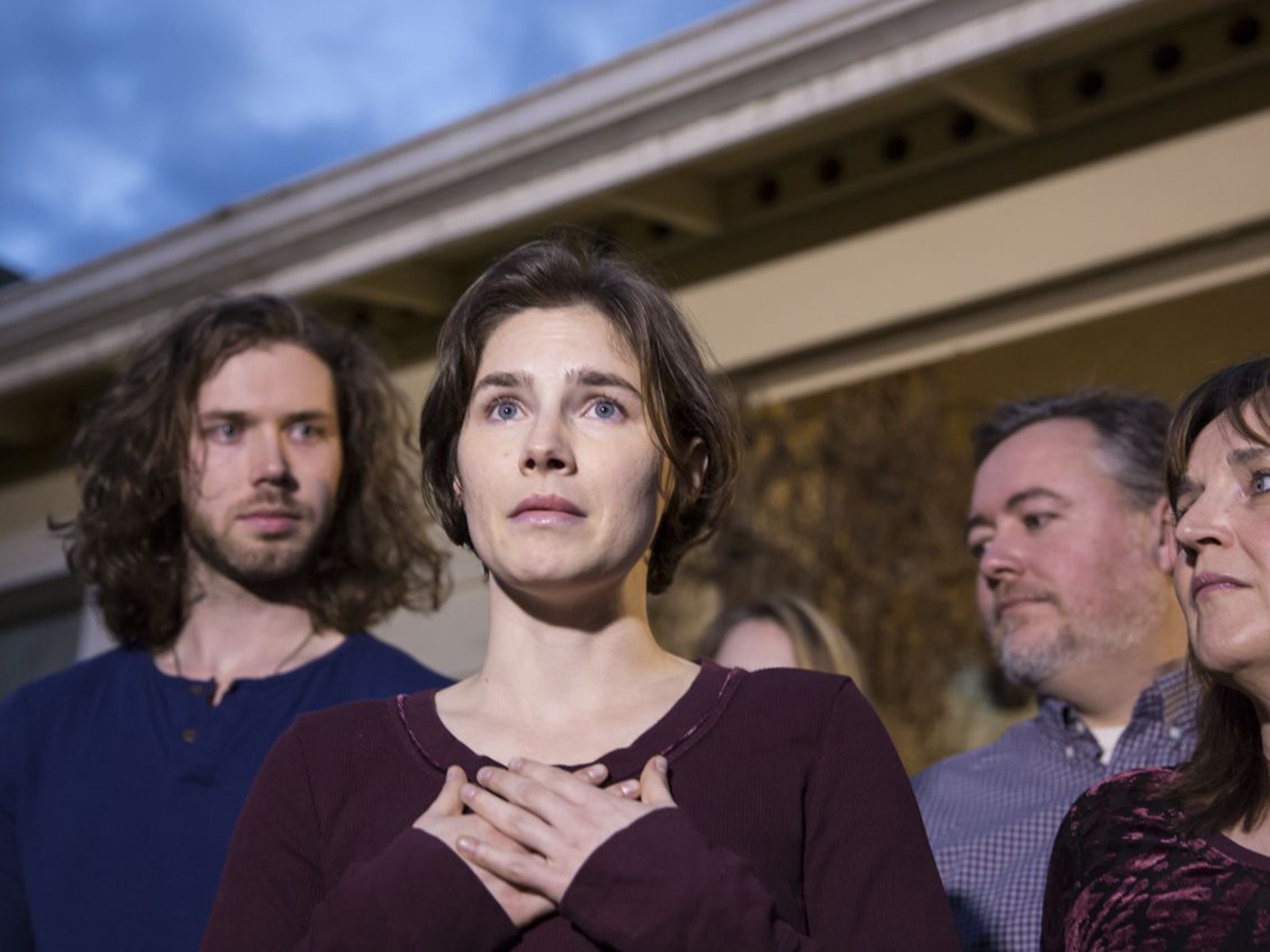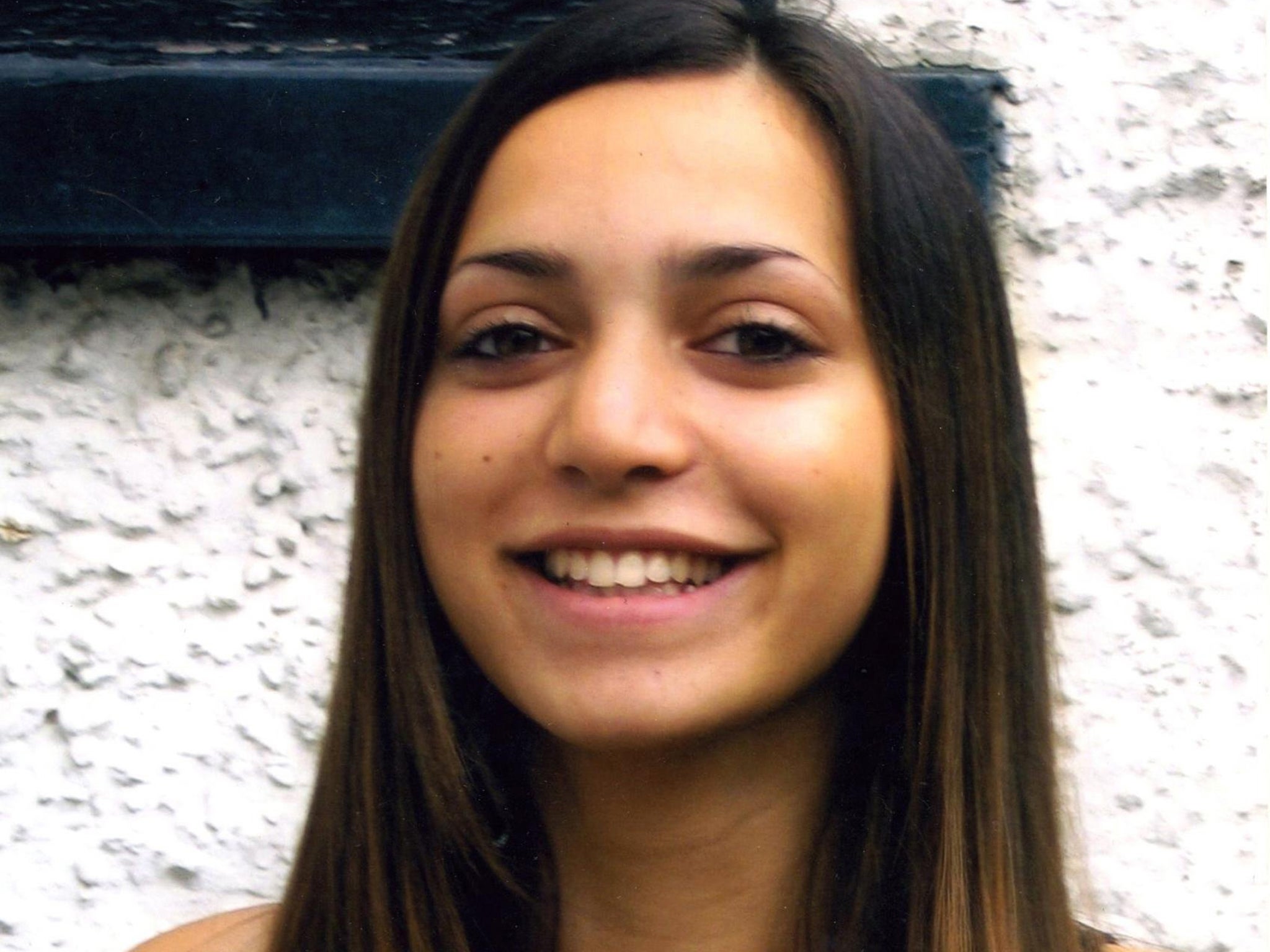Amanda Knox acquitted: Meredith Kercher's family 'bitter' about Italian court's verdict
Murder victim's relatives said to be 'in shock' after Supreme Court of Cassation clears 27-year-old and her former boyfriend Raffaele Sollecito

The lawyer representing the family of the murdered 21-year-old Meredith Kercher said yesterday that there was a “great sense of bitterness” over the decision of an Italian court to absolve definitively Amanda Knox and Raffaele Sollecito of a role in the killing.
Seven and a half years after the murder of Ms Kercher in Perugia, and a number of legal proceedings, Franceso Maresca, the lawyer representing the Kerchers, said yesterday: “The family is in shock after the verdict. They don’t wish to make any other declarations. I’ve had to explain to them there are now no avenues open to them. There is a great sense of bitterness.”
The Kerchers, who had previously spoken of their confidence in the Italian justice system, have made it clear that they believe Ms Knox and Mr Sollecito were involved in the killing, along with Rudy Guede, who has already been jailed for the murder. Italy’s Supreme Court of Cassation cleared Ms Knox and Mr Sollecito late on Friday night.
Mr Maresca says the “changing alibis” of the American Ms Knox, 27, and the Italian Mr Sollecito are what convinced him most of their guilt. But it was the argument that Guede couldn’t have acted alone that left questions unanswered over the case.
In March 2013, another section of the Supreme Court agreed with prosecutors that the pair’s acquittal in 2011 – they were initially found guilty of murder in 2009 – was “contradictory and illogical”, in large part because the lack of stab marks on Ms Kercher’s arms and hands suggested that she had been unable to defend herself from a knife because other people had restrained her. Ms Kercher had had her throat slashed and was sexually assaulted.
Many people who have studied the crime, however, believe it was entirely possible and indeed likely that Guede, who’d already committed a series of burglaries, acted alone when Ms Kercher came home on the fateful evening of 1 November 2007 to a surprised Guede, and crucially, locked him in the house with her.

One such person is David Anderson, a former professor of medicine at Manchester University, now living near Perugia, who is writing a book: Malicious Prosecutions: the Psychopathology of the Law Breaking the Law.
“We have to ask,” he said, “why this investigation was so palpably botched. They had Guede, the clear suspect in a straightforward break-in and sex crime. Why did they have to create this ridiculous smokescreen by including two other people?”
There was criticism of the gung-ho prosecutor in the original Knox trial, Giuliano Mignini, who returned to court to prosecute the American for slander in June 2010.
He was allowed to resume the prosecution of Ms Knox, although he had been convicted in the interim of abuse of office for his alleged campaign of harassment against people he had taken exception to in an earlier, unrelated case. His conviction was eventually overturned on appeal for lack of jurisdiction.
Significantly, though, there is no clear division between the careers of judges and prosecuting magistrates in Italy. They can in theory flit from one role to the other. “So all these prosecutors and judges are magistrates – all from the same caste. Often they know each other. This incestuous system is open to abuse,” said Mr Anderson.

Another problem with the Italian legal system, he said, is that civil actions run parallel with criminal prosecutions, thus creating a lawyers’ feeding frenzy, when the key priority should be establishing the guilt or innocence of those accused. He added: “It would have been better if the Kercher family and the civil claims had been kept out of this while the criminal prosecution was ongoing.”
American journalist Barbie Latza Nadeau, whose book Angel Face recounted the first trial that convicted Knox and Sollecito, said: “The case might be closed officially, but the debate about Knox’s guilt will rage on for years. There are just too many unanswered questions, even for those of us who covered the case from the start.”
But, crucially, she noted: “In a case like this that has been ruled on differently so many times with different results, it’s hard to argue that prosecutors have shown the guilt of Ms Knox beyond reasonable doubt.”
These doubts led to senior appeal Judge Claudio Pratillo Hellmann announcing the pair’s – temporary – acquittal in October 2011. He said prosecutors had failed to provide the court with a murder weapon, a credible motive, a precise time for the killing, reliable DNA evidence or even sufficient proof that Ms Knox and Mr Sollecito had been at the location where the crime occurred.

Late on Friday, Ms Knox said she was “full of joy” about the verdict – although the guilty verdict against Ms Knox for the slander of Patrick Lumumba, a bar owner she falsely accused of the crime, has been upheld. The presiding judge confirmed a three-year sentence would remain. That time has been served. There were reports Ms Knox could seek compensation for the extra four years she has served, while yesterday Francesco Sollecito, the father of Raffaele, said that compensation “is the last thing on their mind”, saying you “could not even quantify” what his son had been through, according to a report in La Repubblica.
Mr Maresca said the Cassation Court appeared to have acted beyond its normal remit in declaring the pair’s innocence. He noted the Supreme Court was supposed to rule on technicalities – and hardly ever made sweeping rulings like the one we saw on Friday.
But Dr Anderson said that the verdict was like a breath of fresh air: “What we saw on Friday night... were five magistrates finally saying basta! [enough].”
Join our commenting forum
Join thought-provoking conversations, follow other Independent readers and see their replies
Comments